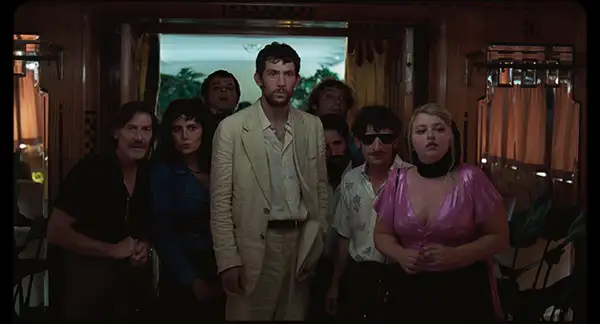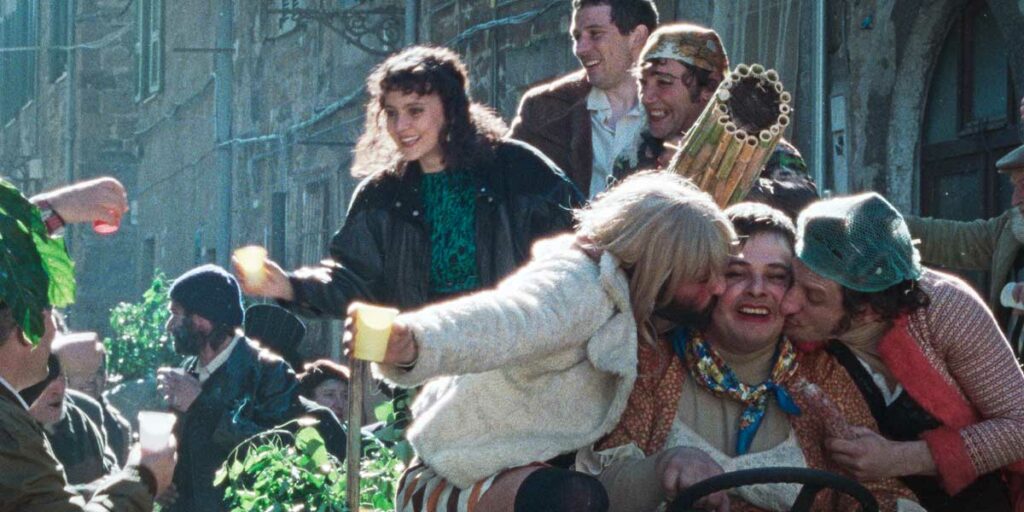Alice Rohrwacher’s new film La Chimera expertly examines the fleeting beauty in life from the tombs of the ancient dead.
For a movie that centers around stealing precious artifacts hidden by the dead, Alice Rohrwacher’s new feature film, La Chimera, has a fiery passion for life and beauty that is palpable throughout the viewing experience.
La Chimera was inspired by the real “tombaroli,” or grave robbers, who existed in a small town in Tuscany where Rohrwacher grew up. She recalls in a Q&A with the New York Film Festival that these grave robbers would come into local bars and cafes to brag about their adventures. While Rohrwacher set out to make a film exploring a fictional version of the lives of these tomb raiders, through the process she created a delicate piece exploring morality, beauty and the illusory hopes (or chimeras) we chase after.
The story revolves around Arthur (Josh O’Connor), a jaded tomb raider with an extensive knowledge of archeology. Those around him are convinced he has a supernatural gift for finding tombs full of precious Etruscan artifacts.
Arthur is returning home after being jailed for his part in robbing ancient graves and contemplating whether or not he will return to his old profession or move on with his life. While he is weighing his options, he visits his former girlfriend’s grandmother, Flora (Isabella Rossellini), and meets her new music student/live-in caretaker, Italia (Carol Duarte). Flora, unaware of how our protagonist earns his living, serves as Arthur’s conscience. She sees him the same way his former girlfriend Beniamina did, and soon Italia becomes a part of this group of women who believe Arthur is a genuinely good soul. Ultimately, after some convincing from the rest of the tombaroli, he decides to return to his old ways, but as the film progresses and he grows closer to Italia, he begins to question the morality of his actions.
Both the irony and beauty behind La Chimera are how much the dead impact Arthur’s way of life and relationship with mortality. His romance with Italia and friendship with Flora drive a reawakening of his soul. Following the revitalization of his sense of morality, Arthur begins to examine the intention behind people being buried with objects they wish to offer to gods as they enter the afterlife. The notion of beauty and the living’s entitlement to beautiful things, no matter how private, plagues our protagonist. He becomes haunted by the crimes against the soul he has committed by stealing from those who created and were buried with beautiful objects that were never supposed to be seen by human eyes.

La Chimera takes the stance that we, as people, cannot understand all the beauty and love in life until we wake up to the beauty and love that surrounds us. These people who have passed on, buried in these tombs, created statues and art to commemorate their lives and immortalize the beauty of their fleeting time on earth. Arthur can only appreciate that once he has opened his eyes to the beauty in his own life and can see these artifacts are both remains and proof of humanity rather than objects to net a profit off of.
What makes Rohrwacher’s film about beauty exist in singularity is that this world she has created is full of imperfections. We see this in various ways from the very beginning of La Chimera; Arthur is being released from prison only to return to the heatless shed he lives in which hangs off the side of a mountain, the tombaroli steal these precious artifacts yet they still are not rich men, Italia wants to be a singer but Flora knows she is helpless.
Rohrwacher’s characters are all flawed and struggling to make something of their lives: they all have their own chimeras they are chasing. However, while on the surface the epicenter of beauty within the film appears to be the ancient artifacts the tombaroli seek, the beauty lies in the imperfections of these characters that add to their sense of humanity.
The performances in La Chimera are truly a treasure. Rohrwacher’s writing allows Isabella Rossellini the chance to demonstrate her comedic chops and she takes advantage of the opportunity with several line deliveries that are laugh-out-loud funny. While the majority of her screen time is spent amongst two seasoned and critically acclaimed actors, Carol Duarte still manages to steal scenes with her witty yet sincere depiction of Flora.
Josh O’Connor, however, proves that he is in a complete league of his own in this film. Arthur is an utterly complex yet endlessly fascinating character and O’Connor expertly executes each one of his moral conundrums. While at the beginning of the film, he plays the apathetic tomb raider with great conviction, his transformation into who Arthur becomes by the film’s end is nothing short of breathtaking. His performance in this role will revitalize something deep inside you.
La Chimera is a celebration of life. It’s the type of film that possesses the type of rareness that makes you believe movies hold magic. It exists in contradictions, both refreshingly referential and utterly unique. It shows you that beauty is not about perfection but rather the imperfections that make things one of a kind. It’ll make you want to live more boldly, love more intensely and appreciate the beauty in everything that surrounds you.
La Chimera was screened at the 2023 New York Film Festival after its World Premiere at Cannes and will be released in US theaters on March 29, 2024 and in UK cinemas on May 10, 2024.

